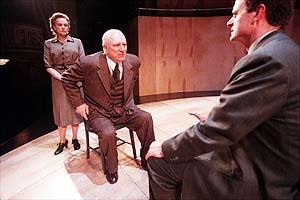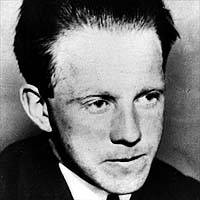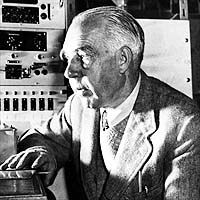New York Times, March 21, 2000
Of Physics, Friendship and Nazi Germany's Atomic Bomb Efforts
Diagram
Waves and Particles on Broadway
By JAMES GLANZ
istorians and scientists are still arguing over whether Werner Heisenberg, the Nobel Prize winner who was Germany's leading scientist during World War II, told the truth about his role in the failed attempt to build an atomic bomb for Hitler.
In the face of decades of accusations to the contrary, Heisenberg always maintained that while he had understood the principles of an atomic bomb, he never seriously considered building one and had deliberately led the German program into concentrating on peaceful uses of atomic energy, like reactors.

Bridget Besaw Gorman for The New York TimesMichael Cumpsty, right, Philip Bosco and Blair Brown rehearse a scene from "Copenhagen." But did he?
Half a century later, that wrenching and still-unresolved question stalks in ghostlike fashion through "Copenhagen," by the British playwright Michael Frayn, that opens next month in New York.
The play revolves around Heisenberg's mysterious wartime meeting in September 1941 with his fellow Nobel laureate and former mentor, the Danish physicist Niels Bohr.
Little is known for certain about the meeting, beyond the fact that Heisenberg talked with Bohr about the possible use of nuclear fission for bombs.
But was Heisenberg trying to extract from Bohr any information the Dane might have had about Allied bomb efforts? Was he trying to assure Bohr that the Germans had no hope of building their own atomic bomb during the war, in hopes that Bohr would persuade American physicists not to develop such a terrible weapon either? Or did he simply wish to ask his old mentor whether physicists were morally justified in applying their knowledge to weapons?
Bohr, who died in 1962, said soon after the meeting that Heisenberg had been trying to elicit information and had claimed that a German bomb could be built. Heisenberg, who after the war openly opposed research on atomic weapons, said he raised with Bohr the possibility that world's physicists might refuse, even in wartime, to build such weapons, both because of their enormous cost and their terrible power.
But many historians and scientists point out inconsistencies in his story, particularly since it seems that he understood much less about bomb physics during the war than he later claimed.
So, was Heisenberg stopped more by his ignorance of bomb physics than by moral scruples? Uncertainty about the meeting in Copenhagen allows that question to live on.
In response to interest raised by the play, a physicist, Dr. Brian Schwartz, has organized a symposium, "Creating Copenhagen," for next Monday at the Graduate Center of the City University of New York, where Dr. Schwartz is vice president for research.
Along with Mr. Frayn and the play's director, Michael Blakemore, participants at the symposium will include two survivors of the Manhattan Project: John Wheeler, who wrote a crucial paper on uranium fission with Bohr in 1939 and is now an emeritus professor at Princeton, and Hans Bethe, a Nobel Prize winner who has turned into a forceful advocate for arms control from his office at Cornell.
As the physicist who all but created the field of theoretical nuclear physics, Dr. Bethe gives some ammunition to both sides in the debate over Heisenberg. On one hand, Dr. Bethe said, secretly recorded conversations between Heisenberg and fellow German scientists show that his understanding of bomb physics was "totally wrong."
But Dr. Bethe said that those scientific mistakes showed that Heisenberg "had never thought how to make a bomb," rather than suggesting that he had merely been stopped by incompetence.
"Then, to me, in 1948, he said his main intention had been to save a few young physicists from going to the war by employing them in the uranium project," Dr. Bethe said. "And indeed there were several promising young German physicists whom he did save. So I believe that motive."
After Nazism's defeat, when the total failure of its bomb program was exposed, Heisenberg himself began telling reporters that his team's theoretical understanding of bomb physics had not been not far behind that of the Allies.
Because financing and industrial support for the German atomic bomb program had been so weak, Heisenberg said, he and his team abandoned the practical goal of actually building a bomb, deliberately concentrating on nuclear reactors.
'The Implication Was Obvious' 
Werner Heisenberg

Niels BohrIn this excerpt from Michael Frayn's play "Copenhagen" (courtesy Methuen), Werner Heisenberg, Niels Bohr and Bohr's wife, Margrethe, try to recall exactly how the shocking topic of weapons based on nuclear fission had come up in their conversation many years before.
MARGRETHE So what was this mysterious thing you said?
HEISENBERG There's no mystery about it. There never was any mystery. I remember it absolutely clearly, because my life was at stake, and I chose my words very carefully. I simply asked you if as a physicist one had the moral right to work on the practical exploitation of atomic energy. Yes?
BOHR I don't recall.
HEISENBERG You don't recall, no, because you immediately became alarmed. You stopped dead in your tracks.
BOHR I was horrified.
HEISENBERG Horrified. Good, you remember that. You stood there gazing at me, horrified.
BOHR Because the implication was obvious. That you were working on it.
HEISENBERG And you jumped to the conclusion that I was trying to provide Hitler with nuclear weapons.
BOHR And you were!
HEISENBERG No! A reactor! That's what we were trying to build! A machine to produce power! To generate electricity, to drive ships.
BOHR You didn't say anything about a reactor.
HEISENBERG I didn't say anything about anything! Not in so many words. I couldn't. I'd no idea how much could be overheard. How much you'd repeat to others.
BOHR But then I asked you if you actually thought that uranium fission could be used for the construction of weapons.
HEISENBERG Ah! It's coming back!
BOHR And I clearly remember what you replied.
HEISENBERG I said I now knew that it could be.
BOHR This is what really horrified me.
But some Allied scientists, notably Dr. Samuel A. Goudsmit, a Dutch-American physicist, took great exception to articles in The New York Times in which Heisenberg aired his views. Goudsmit and other critics said those statements were a whitewash of an active bomb program stymied only by Heisenberg's misunderstanding of some basic physics of bombs.
Dr. Goudsmit, the discoverer of the electron's so-called spin and the founder of the world's most prestigious physics journal, Physical Review Letters, had been the scientific director of the wartime effort by the Allies to learn about Germany's bomb program. His parents had died at Auschwitz.
The possibility that an explanation more like Dr. Goudsmit's was correct made Heisenberg's increasingly frequent statements of concern about the morality of nuclear weapons harder to accept by some Allied scientists.
"I pray that the politicians will be clever enough to save us from the evil misuse of science," Heisenberg, who returned to prominence in German science after the war, told The Associated Press in February 1947.
In later years, "a subtle escalation was introduced," Dr. Jeremy Bernstein in "Hitler's Uranium Club" (AIP Press, 1996) , wrote skeptically. "Not only did they work only on the 'peaceful' reactor, but they actually 'prevented' the atomic bomb from falling into Hitler's hands."
Over the decades, some authors -- most persuasively, Thomas Powers in "Heisenberg's War" (Knopf, 1993) -- would argue that Heisenberg knew more about bomb physics than he let on, but deliberately killed the project. But even if the incompetence argument could be defeated, there remains little evidence of Heisenberg's wartime concern with the morality of atomic weapons -- except, possibly, for Copenhagen.
When Heisenberg later wrote that he had intended to warn Bohr of the enormous technical challenges that stood in the way of building a bomb, implying that Allied scientists could safely refuse to build one too, was he being truthful? By extension, was he truthful about his intentions in the German bomb program itself?
Mr. Frayn, who said he was inspired to write his play after reading Mr. Powers's book, said in an interview that he believed that Heisenberg did have at least some intention to alert Bohr that Germany had little chance of building a bomb then.
"But he's very inhibited about saying it, because the only way he can say it is to commit treason," he said.
Mr. Frayn suggested that after the war, Heisenberg had to be "extremely guarded in what he said," further clouding the historical record. "He didn't want to say, 'I was just incompetent,' or on the other hand, 'I could have done it and I didn't, so I've lost the war for all these other Germans.' "
The play itself offers an imagined version -- actually several versions -- of what might have happened on that night in Copenhagen. Somewhat like particles in the quantum mechanical world that Bohr and Heisenberg did so much to illuminate, the characters seem to exist in many different states of interaction at once.
So each version remains suspended in a state of possibility, unproved but unrefuted.
Mr. Frayn said he was particularly interested in Heisenberg's celebrated uncertainty principle, which states that an irreducible quantum fuzziness, caused by the wavelike nature of matter on small scales, makes it impossible to know simultaneously both a particle's position and its momentum. Human intentions have their own irreducible fuzziness, he said.
An Abstruse Topic Saved His Life During World War II, the Allies so feared the possibility of a German bomb that they sent Moe Berg, a baseballcatcher, linguist and spy, to attend a scientific lecture that the Nazi government allowed the physicist Werner Heisenberg to give in Zurich in 1944. Berg was instructed to carry a pistol and shoot Heisenberg dead if he gave any hint that he was working on an atomic bomb.
Heisenberg restricted his talk to an abstruse topic called S-matrix theory, David C. Cassidy writes in his book "Uncertainty" (W. H. Freeman, 1992). But at dinner, in response to a barbed assertion from a Swiss physicist that Germany had all but lost the war, Heisenberg retorted, "It would have been so beautiful if we had won."
Years later, Heisenberg learned of Berg's mission and quipped that he owed his survival to the difficulty of his topic that day.
*
The mystery of Heisenberg's role in the German atomic program has provided grist for several books, including these:
"Uncertainty," David C. Cassidy, W. H. Freeman and Company, 1992.
"Heisenberg's War," Thomas Powers, Alfred A. Knopf, 1993.
"Hitler's Uranium Club," Jeremy Bernstein, The American Institute of Physics, 1996.
"Neils Bohr's Times," Abraham Pais, Oxford University Press, 1991.
In his research for the play, Mr. Frayn read Heisenberg's original 1927 paper on this Unbestimmtheit -- indeterminacy or uncertainty. Mr. Frayn, 66, who read philosophy at Cambridge but has no formal training in science, said he was "very struck" by how "extremely clear" that original paper was.
Six years old and living in the outer suburbs of London when the war broke out, he remembers watching dogfights and German bombing runs while standing in his garden with his father.
"The war for me was delightful entertainment," he said, recalling with particular fondness the impact one of the German pilotless planes, called V-1's, made when it fell with its explosive charge near his house. "It was a nightmare for my parents," he said. "But I thought, suddenly the house was transformed -- suddenly no boring glass on the windows. We had plaster dust and broken glass everywhere."
But even the young Mr. Frayn became frightened when Werner von Braun's much more effective V-2 rockets began falling. Somehow their great explosions, followed only afterward by the sound of the approaching rocket, unnerved him, he said.
If Heisenberg's program had been as successful as von Braun's, of course, an atomic bomb would have arrived with much more deadly efficiency from the skies above London. Uncertainty about whether the Germans were developing a bomb infused the Manhattan Project with a frenzied urgency.
Despite his acknowledged patriotism, Heisenberg was no great supporter of the Nazis, having defied their attacks on what they called "Jewish science" by continuing to teach Einstein's theory of relativity and by occasionally helping scientists persecuted by the Reich. But as Germany crumbled in the spring of 1945, Allied agents, led by Dr. Goudsmit, were desperate to learn how close Heisenberg and his program had come to making a bomb and, in particular, to keep the scientists and their data out of Russian hands.
Heisenberg and others were quickly rounded up, questioned and finally sequestered for six months at a country manor in Britain called Farm Hall, where microphones secretly recorded many of their conversations. Judging from these, war's end found the German program almost pathetically far behind the Manhattan Project. The German scientists had not even produced the contained nuclear chain-reaction that Enrico Fermi had achieved at the University of Chicago in December 1942, a critical step in the bomb's development.
But until the news came that the Allies had dropped an atomic bomb on Hiroshima, Heisenberg confidently assumed that if German scientists could not build such a weapon, nobody could.
"The reasoning was not bad," Heisenberg later told Waldemar Kaempffert, a science writer at The Times. "After all, it took the United States several years to produce atomic bombs, and the war in Europe was won without their aid."
In fact, the German scientists at Farm Hall initially refused to believe the news; Heisenberg speculated aloud that the Hiroshima weapon was really a juiced-up chemical explosive.
But he finally had to accept how thoroughly the German program had been bested. And in an astonishing recorded conversation with a fellow Farm Hall inmate, the physicist Otto Hahn, Heisenberg confessed he had never even taken the trouble to calculate the minimum amount of uranium-235 one would need to fuel a bomb -- the so-called critical mass. "Quite honestly, I have never worked it out," Heisenberg said, "as I never believed one could get pure 235."
Like Dr. Bethe, Mr. Frayn takes this admission as further evidence that Heisenberg never intended to build a bomb. Others suggest that it merely shows what a hash Heisenberg had made of a project he supported.
By 1947, Dr. Goudsmit was vigorously disputing Mr. Kaempffert's articles on Heisenberg. Mr. Kaempffert, who had covered Heisenberg's original breakthroughs in quantum mechanics 20 years earlier, replied in print that "liars do not win the Nobel Prize," and criticized Dr. Goudsmit's accounts as hot-headed and biased. Mr. Kaempffert added that the "scientific reasoning of Heisenberg and his colleagues was exactly like that of the Americans."
More than 50 years later, the record provides evidence in support of both sides.
Monday's symposium will bring together Dr. Wheeler, 89, and Dr. Bethe, 93, and a number of other physicists and historians, including Dr. Gerald Holton of Harvard and David C.
Cassidy, author of "Uncertainty" (W. H. Freeman, 1992).
"I think both of them are anxious to give a very personal view," Dr. Schwartz said of Dr. Wheeler and Dr. Bethe.
Dr. Schwartz, however, is not sure exactly where the panel members will agree and disagree, except to say that it is unlikely that they will clear up all the remaining questions on what Heisenberg was up to during the war. The uncertainty about Heisenberg may be eternal.